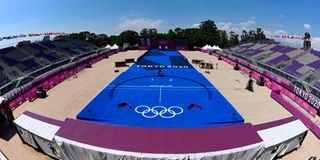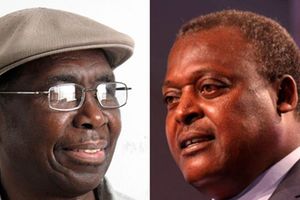Tokyo 2020's turbulent Olympic timeline

A view of the Yumenoshima Park Archery Field, the site for archery events, in Tokyo on July 22, 2021, ahead of the Tokyo 2020 Olympic Games.
What you need to know:
- French magistrates charge the head of Japan's Olympic committee as they probe payments totalling $2.3 million made before and after Tokyo's nomination.
- Tsunekazu Takeda protests his innocence but later steps down.
Tokyo, Japan
It's been a rocky road for Tokyo 2020, from virus postponement to multiple scandals and unprecedented restrictions on fans.
Here, AFP chronicles Japan's troubled journey to the Olympics.
2013: Tears and cheers
News presenters shed tears and crowds erupt in delight as the International Olympic Committee names Tokyo host of the 2020 Games.
Thoughts turn to the victims of Japan's devastating 2011 earthquake, tsunami and Fukushima nuclear disaster, with the Olympics seen as a chance to rebuild.
2015-16: Stadium and logo ditched
Proposals for a new national stadium designed by Zaha Hadid go back to the drawing board in July 2015 following public anger over the $2-billion price tag.
The original Olympic logo design is also ditched over its resemblance to the emblem of a Belgian theatre, and a new "snake-eye" logo is unveiled.
2019: Payments probe
French magistrates charge the head of Japan's Olympic committee as they probe payments totalling $2.3 million made before and after Tokyo's nomination.
Tsunekazu Takeda protests his innocence but later steps down.
In October, the IOC shifts the Olympic marathon to northern Sapporo to avoid the capital's summer heat -- a surprise move that infuriates Tokyo officials.
March 24, 2020: Historic postponement
With the coronavirus spreading rapidly worldwide, Japan and the IOC take the decision to postpone the Olympics for the first time in history.
A new date is announced for the opening ceremony -- July 23, 2021 -- but the event will still be called Tokyo 2020.
January 2021: Virus surge
Public support for the Olympics plunges in Japan as a virus state of emergency is declared in Tokyo to stop a winter spike in infections.
But organisers insist the Games can be held safely, and Prime Minister Yoshihide Suga says they will be "proof of mankind's victory over the virus".
February 2021: Sexism rows
Tokyo 2020 chief Yoshiro Mori resigns after his claims that women talk too much in meetings spark a firestorm of criticism.
He is replaced by Olympic Minister Seiko Hashimoto, a seven-time Olympian who is one of just two women in Japan's cabinet.
Just weeks into her tenure, she accepts the resignation of the creative director for the Games' opening and closing ceremonies after a report reveals he suggested a plus-size female comedian could appear as an "Olympig".
March 2021: No overseas fans
In an Olympic first, overseas fans are barred from the Games to limit infection risks.
As the Olympic torch makes its way across the country, many public sections of the relay are scrapped in areas where virus cases are spiking -- including the final leg in Tokyo.
June 2021: First athletes arrive
The pandemic continues to wreak havoc and debate rages about whether the Olympics should be held as planned.
In a step forward for the troubled event, the first foreign athletes arrive in Japan -- Australia's softball team -- to attend a pre-Games training camp in strict biosecure conditions.
July 2021: Most fans barred
Fears grow over the more infectious Delta strain as cases rebound in Tokyo.
The government reimposes emergency restrictions, leading organisers to ban spectators from virtually all Olympic venues.
As more teams arrive, the first virus cases are detected in the Olympic Village, raising fears of a cluster as some athletes are forced to pull out of the Games.
July 2021: Opening ceremony director fired
The city is gearing up for the first ever pandemic Olympics when on July 22, the day before the Games officially begin, the opening ceremony's director is fired over a decades-old comedy skit referencing the Holocaust.
It comes just days after a composer for the opening ceremony steps down following an outcry over old interviews in which he described abusing disabled schoolmates.





